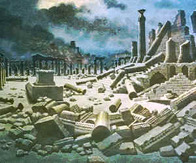
Sermon from St. Gregory, Pope.
No man that hath read the history of the destruction of Jerusalem by the Roman princes, Vespasian and Titus, can be ignorant that it was of that destruction that the Lord spoke when he wept over the ruin of the city. Hence it is these Roman princes that are pointed at where it is said: For the days shall come upon thee that thine enemies shall cast a trench about thee. The truth of what followeth: They shall not leave in thee one stone upon another: is even now fulfilled in the change of site of the city, which hath been rebuilt round about that place outside the gates, where the Lord was crucified, while the ancient city hath been, as I am told, rooted up from the very foundation.

The Saviour wept over the ruin of the unfaithful city, while she herself as yet knew not that it was coming. If thou hadst known, said he, even thou. And we may understand him to have meant: If thou hadst known, thou wouldst thyself have wept, in place of making merry as now thou dost, knowing not what hangeth over thee. And hence he addeth: At least in this thy day, the things which belong unto thy peace. While she was yet giving herself up to fleshly pleasures, and casting no look ahead upon coming sorrows, she had still for a day in her power the things which might have brought her unto peace.




